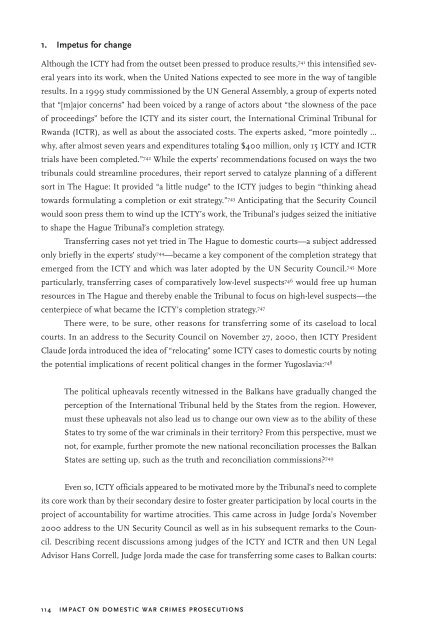That Someone Guilty Be Punished - International Center for ...
That Someone Guilty Be Punished - International Center for ...
That Someone Guilty Be Punished - International Center for ...
You also want an ePaper? Increase the reach of your titles
YUMPU automatically turns print PDFs into web optimized ePapers that Google loves.
1. Impetus <strong>for</strong> change<br />
Although the ICTY had from the outset been pressed to produce results, 741 this intensified several<br />
years into its work, when the United Nations expected to see more in the way of tangible<br />
results. In a 1999 study commissioned by the UN General Assembly, a group of experts noted<br />
that “[m]ajor concerns” had been voiced by a range of actors about “the slowness of the pace<br />
of proceedings” be<strong>for</strong>e the ICTY and its sister court, the <strong>International</strong> Criminal Tribunal <strong>for</strong><br />
Rwanda (ICTR), as well as about the associated costs. The experts asked, “more pointedly …<br />
why, after almost seven years and expenditures totaling $400 million, only 15 ICTY and ICTR<br />
trials have been completed.” 742 While the experts’ recommendations focused on ways the two<br />
tribunals could streamline procedures, their report served to catalyze planning of a different<br />
sort in The Hague: It provided “a little nudge” to the ICTY judges to begin “thinking ahead<br />
towards <strong>for</strong>mulating a completion or exit strategy.” 743 Anticipating that the Security Council<br />
would soon press them to wind up the ICTY’s work, the Tribunal’s judges seized the initiative<br />
to shape the Hague Tribunal’s completion strategy.<br />
Transferring cases not yet tried in The Hague to domestic courts—a subject addressed<br />
only briefly in the experts’ study744 —became a key component of the completion strategy that<br />
emerged from the ICTY and which was later adopted by the UN Security Council. 745 More<br />
particularly, transferring cases of comparatively low-level suspects746 would free up human<br />
resources in The Hague and thereby enable the Tribunal to focus on high-level suspects—the<br />
centerpiece of what became the ICTY’s completion strategy. 747<br />
There were, to be sure, other reasons <strong>for</strong> transferring some of its caseload to local<br />
courts. In an address to the Security Council on November 27, 2000, then ICTY President<br />
Claude Jorda introduced the idea of “relocating” some ICTY cases to domestic courts by noting<br />
the potential implications of recent political changes in the <strong>for</strong>mer Yugoslavia: 748<br />
The political upheavals recently witnessed in the Balkans have gradually changed the<br />
perception of the <strong>International</strong> Tribunal held by the States from the region. However,<br />
must these upheavals not also lead us to change our own view as to the ability of these<br />
States to try some of the war criminals in their territory? From this perspective, must we<br />
not, <strong>for</strong> example, further promote the new national reconciliation processes the Balkan<br />
States are setting up, such as the truth and reconciliation commissions? 749<br />
Even so, ICTY officials appeared to be motivated more by the Tribunal’s need to complete<br />
its core work than by their secondary desire to foster greater participation by local courts in the<br />
project of accountability <strong>for</strong> wartime atrocities. This came across in Judge Jorda’s November<br />
2000 address to the UN Security Council as well as in his subsequent remarks to the Council.<br />
Describing recent discussions among judges of the ICTY and ICTR and then UN Legal<br />
Advisor Hans Correll, Judge Jorda made the case <strong>for</strong> transferring some cases to Balkan courts:<br />
114 IMPACT ON DOMESTIC WAR CRIMES PROSECUTIONS

















